Austrian silent film star Mia May (1884-1980) was one of the first divas of the German cinema. During and after the First World War, she became the subject of countless early film star postcards. The rather matronly but graceful actress was married to the Austrian film producer and director Joe May and appeared in 44 silent films between 1912 and 1924. Mia May was the managing director of the May-Film GmbH, which was founded in 1915 and cut and wrote several of her husband's films. Their only daughter, the lovely Eva May, committed suicide after a promising film career of her own.

German postcard by Ross Verlag, no. 634/6. Photo: May Film. Mia May in Die Herrin der Welt / Mistress of the World (Joe May and others, 1919). Mia May as Maud Gregaard, who at one point is considered the reincarnation of the goddess Astarte.
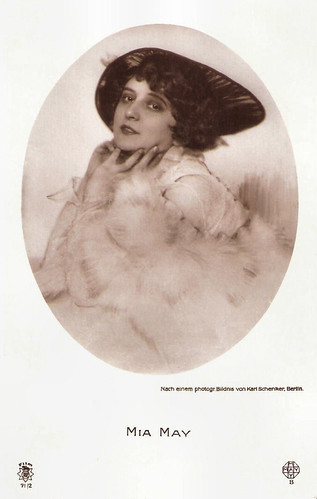
German postcard by Rotophot in the Film Sterne series, no. 71/2. Photo: Karl Schenker, Berlin / May Film.
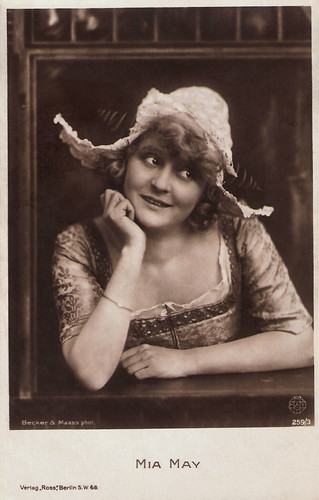
German postcard by Verlag Ross, Berlin, no. 259/3, 1919-1924. Sent by mail in Germany in 1921. Photo: Becker & Maass / May Film.
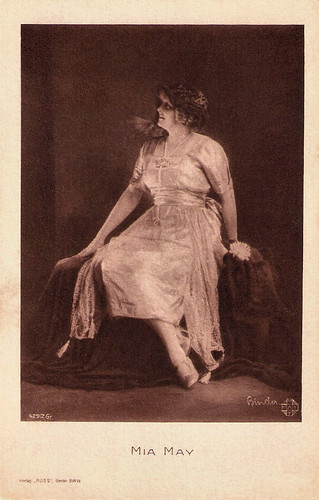
German postcard by Verlag Ross, Berlin, no. 429/2 Gr, 1919-1924. Photo: Alex Binder / May Film.

German postcard by Verlag Ross, Berlin, no. 450/4, 1919-1924. Photo: |Riess / May-Film.
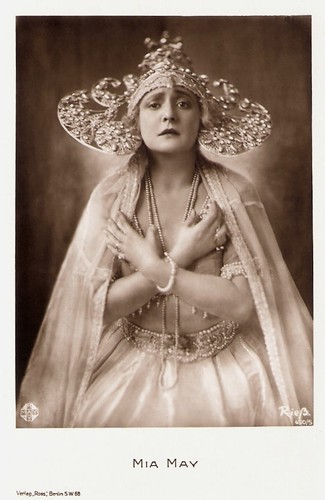
German postcard by Verlag Ross, no. 450/5, 1919-1924. Photo: Riess / May-Film.
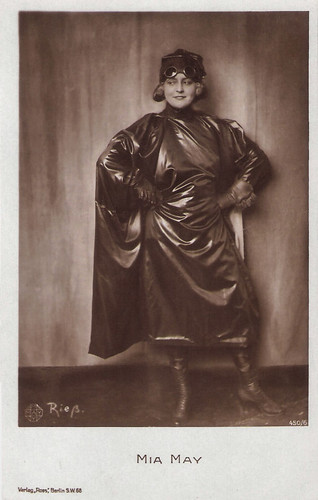
German Postcard by Verlag Ross, no. 450/6, 1919-1924. Photo: Riess / May Film.

German postcard by Verlag Ross, Berlin, no. 2001/3. Photo: Becker & Maass / May Film. Also on Film Sterne, no. 105/4.
Mia May was born as Maria 'Mia' Pfleger in Vienna, Austria, in 1884. Her older sister, Maria (1879-1958), later acted under the stage name Mitzi Telmont. Already as a small child, Mia took ballet lessons and completed her first stage appearance at the Viennese Jantsch-Theater in the K.K. Prater at the age of five. There she played numerous child roles. From the age of 14, she performed on stage under the pseudonym of Herma Angelot. She had engagements at Gabor Stein's summer theatre 'Venice in Vienna' and at Ben Tieber's Apollo-Theater.
In 1902, she married Julius Otto Mandl, who lived off the interest of a fortune, inherited from his wealthy parents. After their marriage, she took a break and on 29 May 1902, she gave birth to their daughter Eva Maria. We probably never would have seen or heard from Mia if her husband hadn't lost his whole fortune by speculating unsuccessfully. For this reason, she returned in 1910 to the stage and appeared again with Ben Tieber at the Apollo-Theater, now under the stage name Mia May, which sounded good on a marquee.
In 1911, Mia accepted an engagement in Hamburg, where she played the role of Clo-Clo in the operetta 'Madame Serafin' at Wilhelm Bendiner's Neue Operettentheater Hamburg. Her husband, Julius Mandl, followed suit and renamed himself Joe May. For the long intervals of the immensely elaborate stage play 'Rund um die Alster', Joe created a nearly 27-minute (two acts) introduction film. Mia May took on several roles in the play, for example, as a rower and as Hammonia. This paved the way for a new career. In 1912, the May family settled in Berlin. Mia May took part in the Friedrich-Wilhelmstädtisches Theater in 'Yvonne in Grigri'. Meanwhile, Joe May was employed as a director by Continental-Kunstfilm GmbH.
Joe's first film for Continental was the about 27-minute In der Tiefe des Schachtes / In the Depths of the Shaft (Joe May, 1912). He gave his wife the leading part of the beautiful Else, the daughter of a captain who kills herself out of disappointed love for a baron. Together, Joe and Mia co-wrote the script. After that, Mia took part in some films of other directors, also because her husband had to return to Vienna to do his military service. These films included the short Wer hebt den Stein? / Life's Temptations (Fritz Bernhardt, 1913) for Imperator-Film, and for Messter-Film Wenn Wunden heilen / When the Wounds Heal (Hans Oberländer, 1913) with Alice Hechy, Olga Engl and Hans Mierendorff.
Her most successful productions were made by her husband, such as the Stuart Webbs detective film Die geheimnisvolle Villa (Joe May, 1914) starring Ernst Reicher, which was also their daughter Eva May's film debut. In 1915, Joe May founded the film company May-Film GmbH, which Mia May became managing director of. Their popular screen escapism included Arme Eva Maria / Poor Eva Maria (Joe May, 1916) with Harry Liedtke, and the Joe Deebs detective films featuring Max Landa. In 1916, she starred in the first film of the Mia May series, the melodrama Die Sünde der Helga Arndt / The Sin of Helga Arndt (Joe May, 1916). It made Mia a diva of the German cinema, and as Hans J. Wollstein noted at AllMovie: "Mia May rivalled Henny Porten and the great Asta Nielsen in popularity."
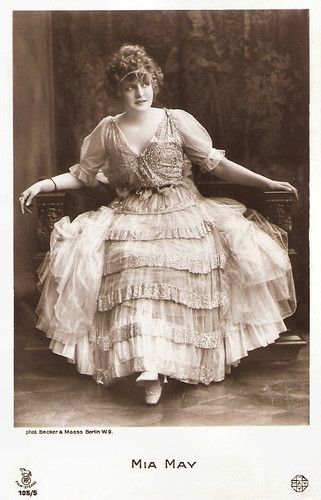
German postcard by Rotophot in the Film Sterne series, no. 105/5, 1916-1919. Photo: Becker & Maass, Berlin / May Film.
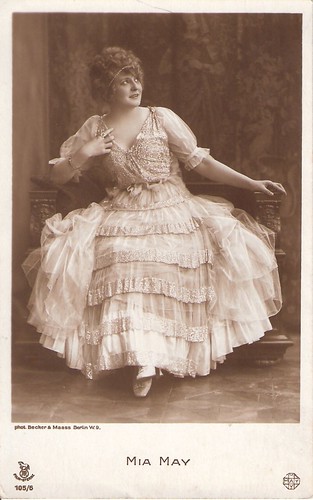
German postcard by Rotophot in the Film Sterne series, no. 105/6, 1916-1919. Photo: Becker & Maass, Berlin / May Film.
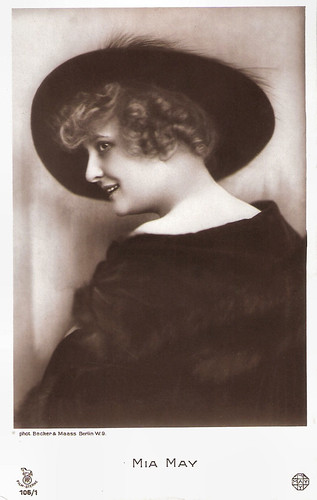
German postcard by Rotophot in the Film Sterne series, no. 106/1, 1919-1924. Photo: May-Film / Becker & Maass, Berlin.
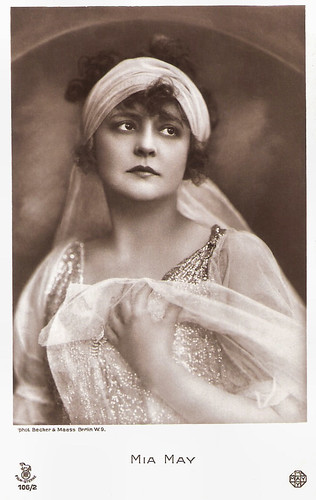
German postcard by Rotophot in the Film Sterne series, no. 106/2, 1919-1924. Photo: May-Film / Becker & Maass, Berlin.
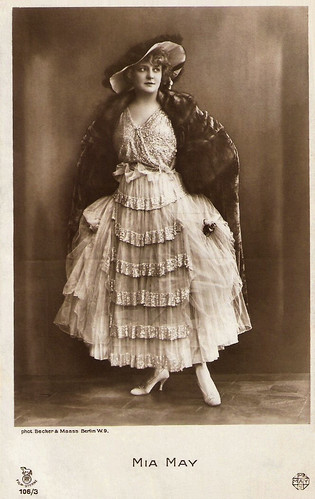
German postcard by Rotophot in the Film Sterne series, no. 106/3, 1916-1919. Photo: May-Film / Becker & Maass, Berlin.
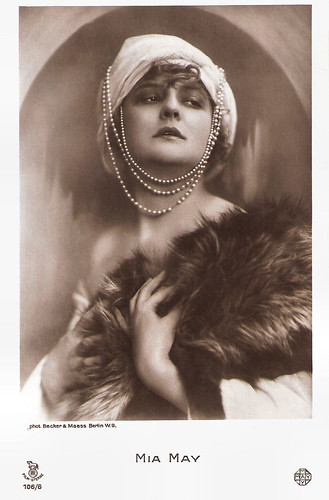
German postcard by Rotophot in the Film Sterne series, no. 106/6, 1919-1924. Photo: May-Film / Becker & Maass, Berlin.
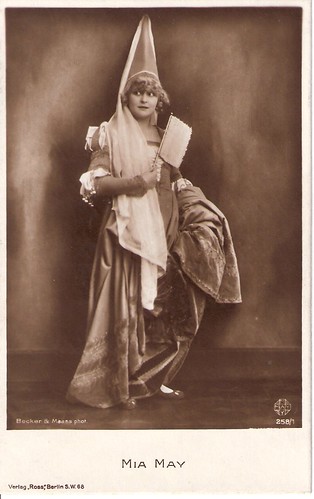
German postcard by Ross Verlag, Berlin, no. 258/1, 1919-1924. Photo: Becker & Maass phot. / May Film.
One of Mia May's greatest successes was Hilde Warren und der Tod / Hilde Warren and Death (Joe May, 1917), about a successful actress whose life takes a tragic turn through her marriage with a nefarious murderer. Mia May starred opposite Georg John as The Dead and the later director Fritz Lang, who had also written the screenplay.
The Medieval costume on the postcard immediately above perhaps refers to Veritas vincit (Joe May, 1919), a trilogy in three epochs: Roman Antiquity, the Middle Ages and modern times. In the last months of the First World War, between July and September 1918, this three-hour episode film was realised, which is regarded as the first monumental film in German film history. In the historical episodes, untruthful antagonists decide upon the tragic destiny of Mia's characters, but in modern times, Truth conquers at last when Mia in the end confesses the truth, saving her love played by Johannes Riemann, and defying society. The film was a huge success.
In December 1919, Die Freundin des gelben Mannes / The Dragon's Claw, the pilot film of the elaborate eight-part film serial Die Herrin der Welt / Mistress of the World (Joe May, Joseph Klein, 1919-1920) was released in cinemas. The other seven parts started within a few weeks until the end of January 1920. In the monumental and enormously successful series, Mia May played a Danish educator who becomes a billionaire and philanthropist through her numerous adventures in Europe, Asia, Africa and America. In the end, she takes revenge on a diabolical baron who seduced her and is responsible for the death of her father and her lover.
Mia May incidentally acted in films made by other directors. An example is Die Platonische Ehe / Platonic Marriage (Paul Leni, 1919) with Georg Alexander. Directed by Fritz Lang, Mia starred in Das wandernde Bild / The Wandering Image (Fritz Lang, 1920), about the dramatic love of a pregnant woman for a writer unwilling to marry.
Under the direction of her husband, Mia May then played a role in the two-part adventure epic Das Indische Grabmal / The Indian Tomb (Joe May, 1921). This mammoth undertaking starred the hypnotic Conrad Veidt, Danish matinee idol Olaf Fönss, and Lya de Putti. The screenplay was written by Thea von Harbou and her husband, Fritz Lang. Mia May acted not only in the films of her husband, but she also sometimes co-wrote and cut them. At times, she also managed May Film.

German postcard by Photochemie, Berlin, no. K. 2019. Photo: Union-Film. Mia May in Charley, der Wunderaffe / Charley, the Wonder Monkey (Joe May, 1915).
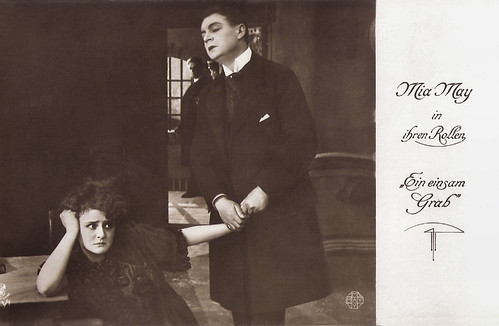
German postcard by Rotophot in the Film Sterne series, no. 93/1. Photo: May-Film. Publicity still for Ein einsam Grab / A Lonely Grave (Karl Gerhardt, 1916) with Hans Mierendorff.
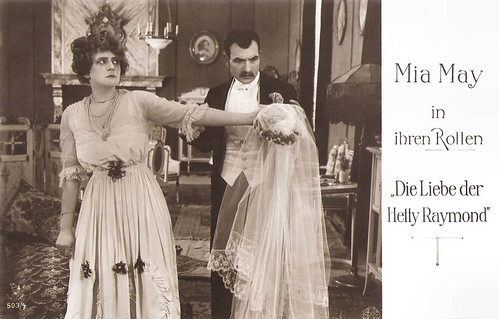
German postcard by Rotophot in the Film Sterne series, no. 503/4. Photo: May-Film. Publicity still for Die Liebe der Hetty Raymond / The Love of Hetty Raymond (Joe May, 1917).
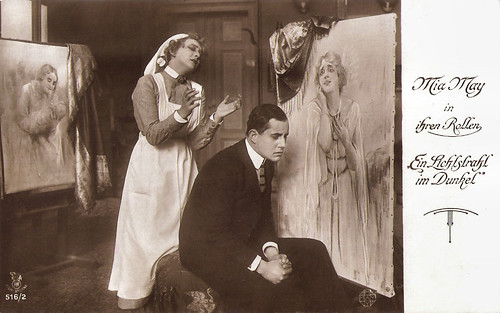
German postcard by Rotophot in the Film Sterne series, no. 516/2. Photo: May Film. Mia May and Bruno Kastner in Ein Lichtstrahl im Dunkel / A Ray of Light in the Dark (Joe May, 1917).
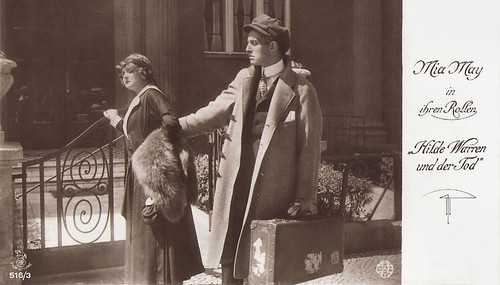
German postcard by Rotophot in the Film Sterne series, no. 516/3, 1919-1924. Photo: May-Film. Publicity still for Hilde Warren und der Tod / Hilde Warren and Death (Joe May, 1917) with Bruno Kastner.
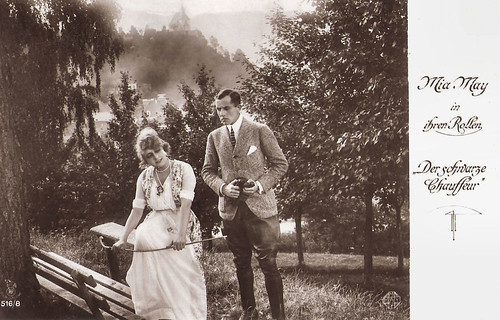
German postcard by Rotophot in the Film Sterne series, no. 516/8. Photo: May-Film / Becker & Maass. Publicity still for Der Schwarze Chauffeur / The Black Chauffeur (Joe May, 1917) with Bruno Kastner.
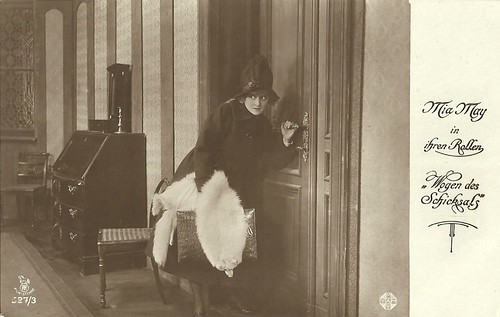
German postcard by Rotophot in the Film Sterne series, no. 527/3. Photo: May Film. Mia May in Wogen des Schicksals / Waves of Fate (Joe May, 1918).
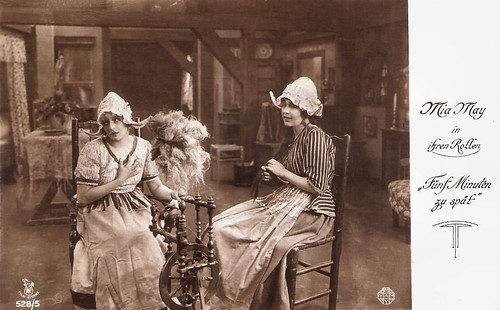
German postcard by Rotophot in the Film Sterne series, no. 528/5. Photo: May Film. Publicity still for Fünf Minuten zu spät / Five Minutes Too Late (Uwe Jens Krafft, 1918).
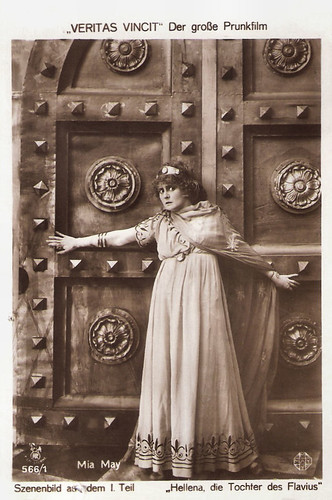
German postcard by Rotophot in the Film Sterne series, no. 566/1. Photo: May-Film. Publicity still for Veritas vincit (Joe May, 1919). Caption: Veritas vincit. Der grosse Prunkfilm. Szenenbild aus dem I. Teil. Helena, die Tochter des Flavius. (Helena, Flavius' daughter).

German postcard by Ross Verlag, no. 634/15. Photo: May Film. Mia May and Henry Sze in Die Herrin der Welt / Mistress of the World (Joe May and others, 1919).
In the 1920s, Mia May reduced her screen appearances in favour of her daughter, who was aspiring as a film star. Eva May debuted at May Film and took over the leading parts. Mia only played smaller parts in big productions
In the four-parter Tragödie der Liebe / The Tragedy of Love (Joe May, 1923), she impersonated a countess who is looking for her husband's murderer. In contrast to her earlier successes, she was not judged very positively by the critics in this role.
After her daughter Eva's tragic suicide in 1924, Mia retired. Mia May's final screen appearance was in Die Liebesbriefe der Baronin von S... / The Love Letters of Baroness S (Henrik Galeen, 1924). In the middle of 1926, another film with her was announced: Joe May wanted to film Henri Bataille's 'Maman Colibri' with her. But the production was never realised.
In 1933 Mia and Joe, who as a Jew wasn't allowed to work in Germany anymore, fled the Nazis via France to America. In Hollywood, Joe May directed several action films for Universal until the middle of the 1940s, but after that, there were no offers. With the support of emigrated friends and colleagues (among them Hedy Lamarr, Otto Preminger, Walter Reisch and Robert Siodmak), the Mays opened the Viennese restaurant 'Blue Danube' in West Los Angeles in April 1949. However, the restaurant only lasted a few months.
In the following years, the couple stayed afloat with the help of friends and the aid organisation 'European Film Fund'. Joe May died in 1954. Mia May never filmed again. She died in 1980 in Los Angeles.
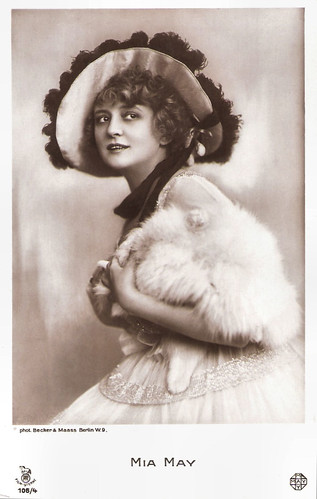
German postcard by Verlag Ross, Berlin, no. 105/4, 1919-1924. Photo: May-Film / Becker & Maass.
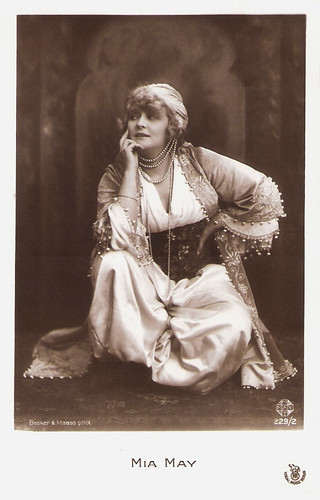
German postcard by Verlag Ross, Berlin, no. 229/2, 1919-1924. Photo: May-Film / Becker & Maass.
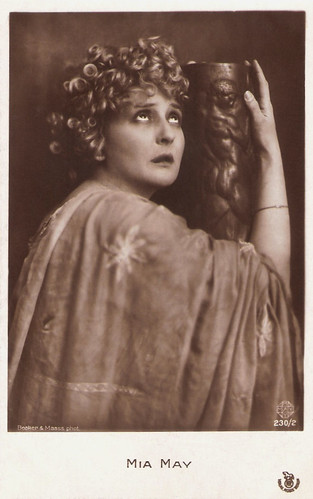
German postcard by Verlag Ross, Berlin, no. 230/2, 1919-1924. Photo: May-Film / Becker & Maass.br />
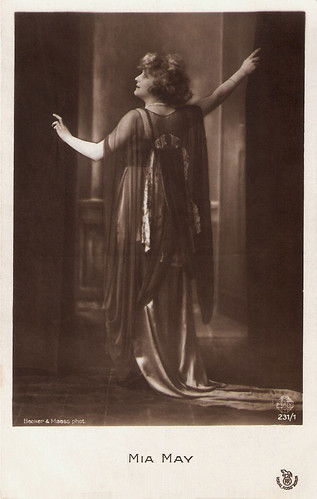
German postcard by Verlag Ross, Berlin, no. 231/1, 1919-1924. Photo: May-Film / Becker & Maass.

German postcard by Verlag Ross, Berlin, no. 259/2, 1919-1924. Photo: May-Film / Becker & Maass. Mia May in her costume of Fünf Minuten zu spät / Five Minutes Too Late (Uwe Jens Krafft, 1918).
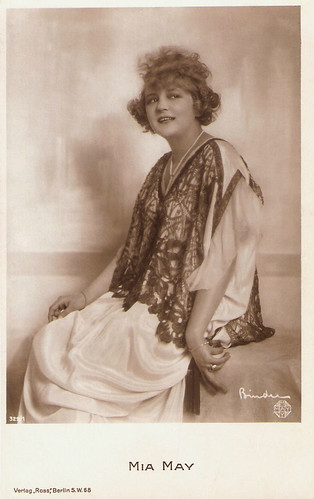
German postcard by Verlag Ross, Berlin, no. 329/1, 1919-1924. Photo: May-Film / Alex Binder.

German postcard by Verlag Ross, Berlin, no. 428/2, 1919-1924. Photo: May-Film / Alex Binder. Collection: Geoffrey Donaldson Institute.
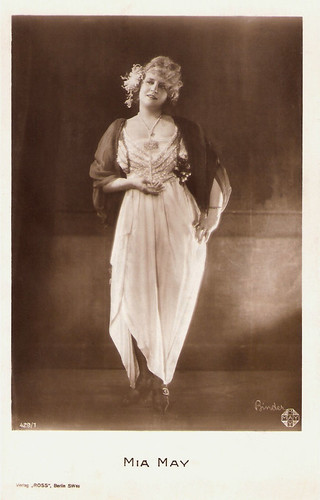
German postcard by Ross Verlag, Berlin, no. 429/1, 1919-1924. Photo: May-Film / Alex Binder.
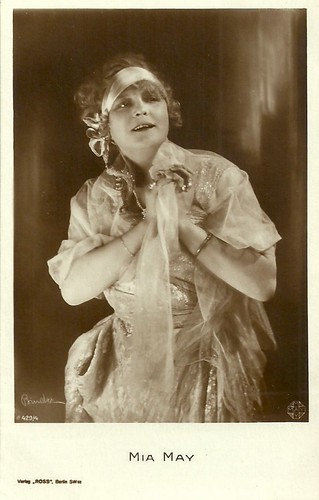
German postcard by Ross Verlag, Berlin, no. 429/4, 1919-1924. Photo: May-Film / Alex Binder.
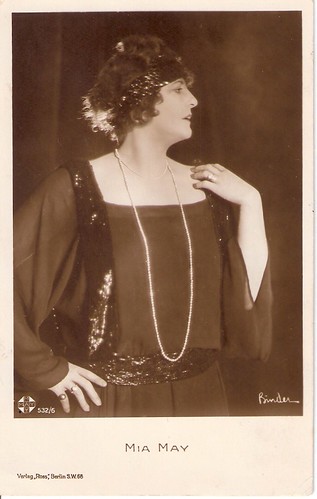
German postcard by Ross Verlag, Berlin, no. 532/6, 1919-1924. Photo: Binder / May Film.
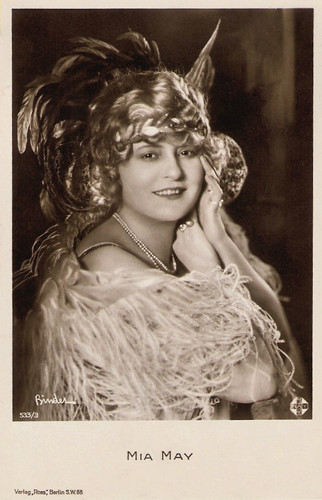
German postcard by Ross Verlag, Berlin, no. 533/3, 1919-1924. Photo: May-Film / Alex Binder.
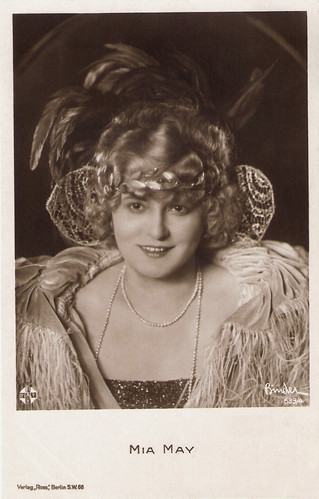
German postcard by Ross Verlag, Berlin, no. 533/4, 1919-1924. Photo: May-Film / Alex Binder.
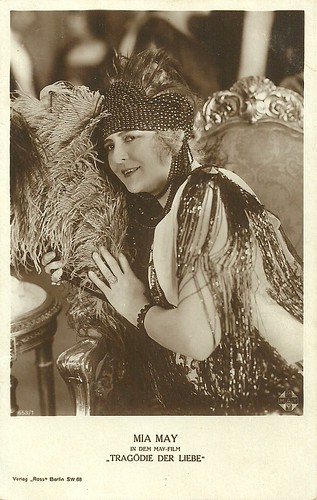
German postcard by Ross Verlag, Berlin, no. 653/1, 1919-1924. Photo: May-Film. Mia May in Tragödie der Liebe / Tragedy of Love (Joe May, 1923).
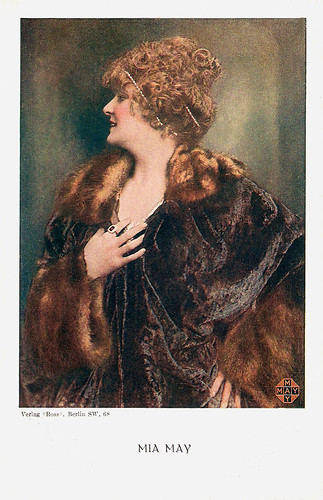
German postcard by Ross Verlag, Berlin, no. 2001/4. Photo: Becker & Maass / May Film.
Sources: Hans J. Wollstein (AllMovie - Page now defunct), Thomas Staedeli (Cyranos), Filmportal and IMDb.
This post was last updated on 2 July 2025.

German postcard by Ross Verlag, no. 634/6. Photo: May Film. Mia May in Die Herrin der Welt / Mistress of the World (Joe May and others, 1919). Mia May as Maud Gregaard, who at one point is considered the reincarnation of the goddess Astarte.

German postcard by Rotophot in the Film Sterne series, no. 71/2. Photo: Karl Schenker, Berlin / May Film.

German postcard by Verlag Ross, Berlin, no. 259/3, 1919-1924. Sent by mail in Germany in 1921. Photo: Becker & Maass / May Film.

German postcard by Verlag Ross, Berlin, no. 429/2 Gr, 1919-1924. Photo: Alex Binder / May Film.

German postcard by Verlag Ross, Berlin, no. 450/4, 1919-1924. Photo: |Riess / May-Film.

German postcard by Verlag Ross, no. 450/5, 1919-1924. Photo: Riess / May-Film.

German Postcard by Verlag Ross, no. 450/6, 1919-1924. Photo: Riess / May Film.

German postcard by Verlag Ross, Berlin, no. 2001/3. Photo: Becker & Maass / May Film. Also on Film Sterne, no. 105/4.
Popular screen escapism
Mia May was born as Maria 'Mia' Pfleger in Vienna, Austria, in 1884. Her older sister, Maria (1879-1958), later acted under the stage name Mitzi Telmont. Already as a small child, Mia took ballet lessons and completed her first stage appearance at the Viennese Jantsch-Theater in the K.K. Prater at the age of five. There she played numerous child roles. From the age of 14, she performed on stage under the pseudonym of Herma Angelot. She had engagements at Gabor Stein's summer theatre 'Venice in Vienna' and at Ben Tieber's Apollo-Theater.
In 1902, she married Julius Otto Mandl, who lived off the interest of a fortune, inherited from his wealthy parents. After their marriage, she took a break and on 29 May 1902, she gave birth to their daughter Eva Maria. We probably never would have seen or heard from Mia if her husband hadn't lost his whole fortune by speculating unsuccessfully. For this reason, she returned in 1910 to the stage and appeared again with Ben Tieber at the Apollo-Theater, now under the stage name Mia May, which sounded good on a marquee.
In 1911, Mia accepted an engagement in Hamburg, where she played the role of Clo-Clo in the operetta 'Madame Serafin' at Wilhelm Bendiner's Neue Operettentheater Hamburg. Her husband, Julius Mandl, followed suit and renamed himself Joe May. For the long intervals of the immensely elaborate stage play 'Rund um die Alster', Joe created a nearly 27-minute (two acts) introduction film. Mia May took on several roles in the play, for example, as a rower and as Hammonia. This paved the way for a new career. In 1912, the May family settled in Berlin. Mia May took part in the Friedrich-Wilhelmstädtisches Theater in 'Yvonne in Grigri'. Meanwhile, Joe May was employed as a director by Continental-Kunstfilm GmbH.
Joe's first film for Continental was the about 27-minute In der Tiefe des Schachtes / In the Depths of the Shaft (Joe May, 1912). He gave his wife the leading part of the beautiful Else, the daughter of a captain who kills herself out of disappointed love for a baron. Together, Joe and Mia co-wrote the script. After that, Mia took part in some films of other directors, also because her husband had to return to Vienna to do his military service. These films included the short Wer hebt den Stein? / Life's Temptations (Fritz Bernhardt, 1913) for Imperator-Film, and for Messter-Film Wenn Wunden heilen / When the Wounds Heal (Hans Oberländer, 1913) with Alice Hechy, Olga Engl and Hans Mierendorff.
Her most successful productions were made by her husband, such as the Stuart Webbs detective film Die geheimnisvolle Villa (Joe May, 1914) starring Ernst Reicher, which was also their daughter Eva May's film debut. In 1915, Joe May founded the film company May-Film GmbH, which Mia May became managing director of. Their popular screen escapism included Arme Eva Maria / Poor Eva Maria (Joe May, 1916) with Harry Liedtke, and the Joe Deebs detective films featuring Max Landa. In 1916, she starred in the first film of the Mia May series, the melodrama Die Sünde der Helga Arndt / The Sin of Helga Arndt (Joe May, 1916). It made Mia a diva of the German cinema, and as Hans J. Wollstein noted at AllMovie: "Mia May rivalled Henny Porten and the great Asta Nielsen in popularity."

German postcard by Rotophot in the Film Sterne series, no. 105/5, 1916-1919. Photo: Becker & Maass, Berlin / May Film.

German postcard by Rotophot in the Film Sterne series, no. 105/6, 1916-1919. Photo: Becker & Maass, Berlin / May Film.

German postcard by Rotophot in the Film Sterne series, no. 106/1, 1919-1924. Photo: May-Film / Becker & Maass, Berlin.

German postcard by Rotophot in the Film Sterne series, no. 106/2, 1919-1924. Photo: May-Film / Becker & Maass, Berlin.

German postcard by Rotophot in the Film Sterne series, no. 106/3, 1916-1919. Photo: May-Film / Becker & Maass, Berlin.

German postcard by Rotophot in the Film Sterne series, no. 106/6, 1919-1924. Photo: May-Film / Becker & Maass, Berlin.

German postcard by Ross Verlag, Berlin, no. 258/1, 1919-1924. Photo: Becker & Maass phot. / May Film.
Veritas Vincit
One of Mia May's greatest successes was Hilde Warren und der Tod / Hilde Warren and Death (Joe May, 1917), about a successful actress whose life takes a tragic turn through her marriage with a nefarious murderer. Mia May starred opposite Georg John as The Dead and the later director Fritz Lang, who had also written the screenplay.
The Medieval costume on the postcard immediately above perhaps refers to Veritas vincit (Joe May, 1919), a trilogy in three epochs: Roman Antiquity, the Middle Ages and modern times. In the last months of the First World War, between July and September 1918, this three-hour episode film was realised, which is regarded as the first monumental film in German film history. In the historical episodes, untruthful antagonists decide upon the tragic destiny of Mia's characters, but in modern times, Truth conquers at last when Mia in the end confesses the truth, saving her love played by Johannes Riemann, and defying society. The film was a huge success.
In December 1919, Die Freundin des gelben Mannes / The Dragon's Claw, the pilot film of the elaborate eight-part film serial Die Herrin der Welt / Mistress of the World (Joe May, Joseph Klein, 1919-1920) was released in cinemas. The other seven parts started within a few weeks until the end of January 1920. In the monumental and enormously successful series, Mia May played a Danish educator who becomes a billionaire and philanthropist through her numerous adventures in Europe, Asia, Africa and America. In the end, she takes revenge on a diabolical baron who seduced her and is responsible for the death of her father and her lover.
Mia May incidentally acted in films made by other directors. An example is Die Platonische Ehe / Platonic Marriage (Paul Leni, 1919) with Georg Alexander. Directed by Fritz Lang, Mia starred in Das wandernde Bild / The Wandering Image (Fritz Lang, 1920), about the dramatic love of a pregnant woman for a writer unwilling to marry.
Under the direction of her husband, Mia May then played a role in the two-part adventure epic Das Indische Grabmal / The Indian Tomb (Joe May, 1921). This mammoth undertaking starred the hypnotic Conrad Veidt, Danish matinee idol Olaf Fönss, and Lya de Putti. The screenplay was written by Thea von Harbou and her husband, Fritz Lang. Mia May acted not only in the films of her husband, but she also sometimes co-wrote and cut them. At times, she also managed May Film.

German postcard by Photochemie, Berlin, no. K. 2019. Photo: Union-Film. Mia May in Charley, der Wunderaffe / Charley, the Wonder Monkey (Joe May, 1915).

German postcard by Rotophot in the Film Sterne series, no. 93/1. Photo: May-Film. Publicity still for Ein einsam Grab / A Lonely Grave (Karl Gerhardt, 1916) with Hans Mierendorff.

German postcard by Rotophot in the Film Sterne series, no. 503/4. Photo: May-Film. Publicity still for Die Liebe der Hetty Raymond / The Love of Hetty Raymond (Joe May, 1917).

German postcard by Rotophot in the Film Sterne series, no. 516/2. Photo: May Film. Mia May and Bruno Kastner in Ein Lichtstrahl im Dunkel / A Ray of Light in the Dark (Joe May, 1917).

German postcard by Rotophot in the Film Sterne series, no. 516/3, 1919-1924. Photo: May-Film. Publicity still for Hilde Warren und der Tod / Hilde Warren and Death (Joe May, 1917) with Bruno Kastner.

German postcard by Rotophot in the Film Sterne series, no. 516/8. Photo: May-Film / Becker & Maass. Publicity still for Der Schwarze Chauffeur / The Black Chauffeur (Joe May, 1917) with Bruno Kastner.

German postcard by Rotophot in the Film Sterne series, no. 527/3. Photo: May Film. Mia May in Wogen des Schicksals / Waves of Fate (Joe May, 1918).

German postcard by Rotophot in the Film Sterne series, no. 528/5. Photo: May Film. Publicity still for Fünf Minuten zu spät / Five Minutes Too Late (Uwe Jens Krafft, 1918).

German postcard by Rotophot in the Film Sterne series, no. 566/1. Photo: May-Film. Publicity still for Veritas vincit (Joe May, 1919). Caption: Veritas vincit. Der grosse Prunkfilm. Szenenbild aus dem I. Teil. Helena, die Tochter des Flavius. (Helena, Flavius' daughter).

German postcard by Ross Verlag, no. 634/15. Photo: May Film. Mia May and Henry Sze in Die Herrin der Welt / Mistress of the World (Joe May and others, 1919).
Tragic suicide
In the 1920s, Mia May reduced her screen appearances in favour of her daughter, who was aspiring as a film star. Eva May debuted at May Film and took over the leading parts. Mia only played smaller parts in big productions
In the four-parter Tragödie der Liebe / The Tragedy of Love (Joe May, 1923), she impersonated a countess who is looking for her husband's murderer. In contrast to her earlier successes, she was not judged very positively by the critics in this role.
After her daughter Eva's tragic suicide in 1924, Mia retired. Mia May's final screen appearance was in Die Liebesbriefe der Baronin von S... / The Love Letters of Baroness S (Henrik Galeen, 1924). In the middle of 1926, another film with her was announced: Joe May wanted to film Henri Bataille's 'Maman Colibri' with her. But the production was never realised.
In 1933 Mia and Joe, who as a Jew wasn't allowed to work in Germany anymore, fled the Nazis via France to America. In Hollywood, Joe May directed several action films for Universal until the middle of the 1940s, but after that, there were no offers. With the support of emigrated friends and colleagues (among them Hedy Lamarr, Otto Preminger, Walter Reisch and Robert Siodmak), the Mays opened the Viennese restaurant 'Blue Danube' in West Los Angeles in April 1949. However, the restaurant only lasted a few months.
In the following years, the couple stayed afloat with the help of friends and the aid organisation 'European Film Fund'. Joe May died in 1954. Mia May never filmed again. She died in 1980 in Los Angeles.

German postcard by Verlag Ross, Berlin, no. 105/4, 1919-1924. Photo: May-Film / Becker & Maass.

German postcard by Verlag Ross, Berlin, no. 229/2, 1919-1924. Photo: May-Film / Becker & Maass.

German postcard by Verlag Ross, Berlin, no. 230/2, 1919-1924. Photo: May-Film / Becker & Maass.br />

German postcard by Verlag Ross, Berlin, no. 231/1, 1919-1924. Photo: May-Film / Becker & Maass.

German postcard by Verlag Ross, Berlin, no. 259/2, 1919-1924. Photo: May-Film / Becker & Maass. Mia May in her costume of Fünf Minuten zu spät / Five Minutes Too Late (Uwe Jens Krafft, 1918).

German postcard by Verlag Ross, Berlin, no. 329/1, 1919-1924. Photo: May-Film / Alex Binder.

German postcard by Verlag Ross, Berlin, no. 428/2, 1919-1924. Photo: May-Film / Alex Binder. Collection: Geoffrey Donaldson Institute.

German postcard by Ross Verlag, Berlin, no. 429/1, 1919-1924. Photo: May-Film / Alex Binder.

German postcard by Ross Verlag, Berlin, no. 429/4, 1919-1924. Photo: May-Film / Alex Binder.

German postcard by Ross Verlag, Berlin, no. 532/6, 1919-1924. Photo: Binder / May Film.

German postcard by Ross Verlag, Berlin, no. 533/3, 1919-1924. Photo: May-Film / Alex Binder.

German postcard by Ross Verlag, Berlin, no. 533/4, 1919-1924. Photo: May-Film / Alex Binder.

German postcard by Ross Verlag, Berlin, no. 653/1, 1919-1924. Photo: May-Film. Mia May in Tragödie der Liebe / Tragedy of Love (Joe May, 1923).

German postcard by Ross Verlag, Berlin, no. 2001/4. Photo: Becker & Maass / May Film.
Sources: Hans J. Wollstein (AllMovie - Page now defunct), Thomas Staedeli (Cyranos), Filmportal and IMDb.
This post was last updated on 2 July 2025.
No comments:
Post a Comment